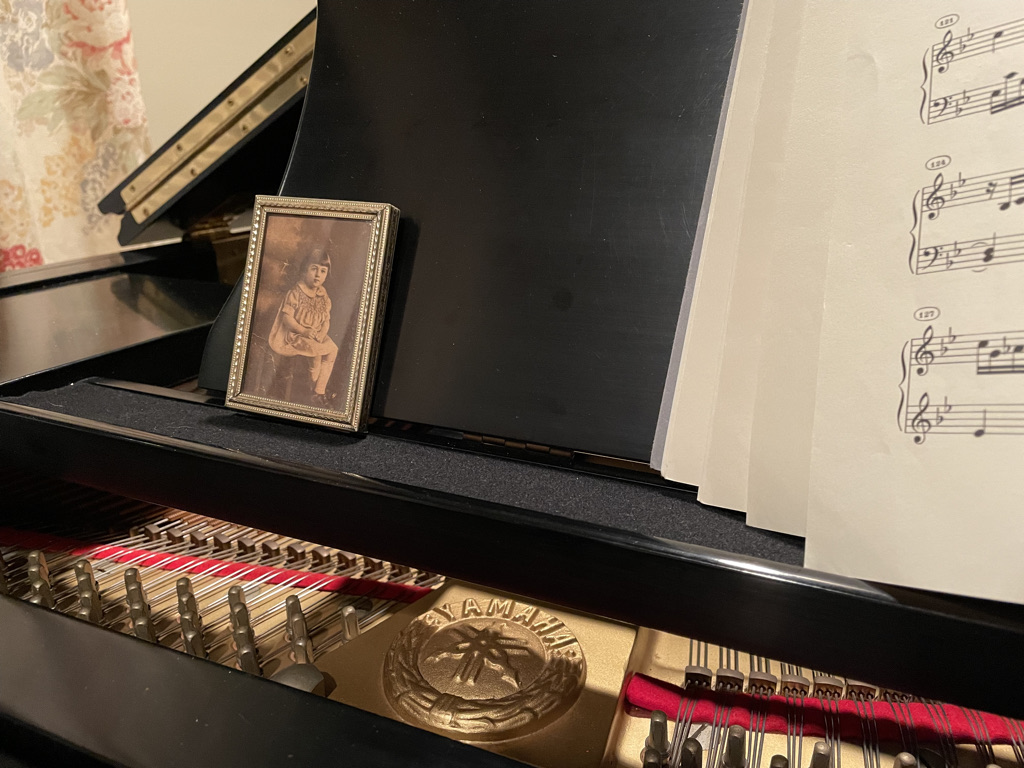J. S. Bach, who dwells among my pantheon of giants, often ended his minor-key pieces on a major chord. It’s an uplifting sound, the aural equivalent of sun rays splitting an overcast sky. A small plaster bust of Bach sits on my piano. Bach, and a tiny, metal-framed photograph of my mother taken when she was about three years old.
My piano. My new piano. More accurately, my new, old piano. It’s a 1969 Yamaha model C3. I’ve wanted a black grand piano basically my whole life, and now I have one. It’s a gift from my mother, Esther. She died almost exactly a year to the day before the piano’s arrival in my living room. It’s her final gift, paid for with a portion of the small inheritance she left. Unlike a new car or even a new house, to a pianist — even an amateur like me — the acquisition of a piano is a visceral event. And emotional event.
My mother had the wisdom to not wait to obtain a piano for the house, after observing how her six-year-old son was always drawn to a piano and picked out chords and melodies. In 1961 she discussed this with her father, who paid for a Schroeder console upright from Kauffman’s department store in Pittsburgh, Pennsylvania. I played that instrument for 50 years. It moved with me wherever I lived after college. Then the pinblock started to wear out. A wise tuner/technician advised me that the Schroeder, being a department store grade piano to begin with, might be a sentimental item but wasn’t worth the cost to rebuild. So I donated it about 10 years ago. Then I played another upright with several mechanical issues, and with which I never really developed a relationship.

I know that my mother, from where her spirit dwells, is pleased. She got me into piano lessons at 7, and schlepped me to them weekly until I was old enough to drive myself. More than that, she was a supporter of my playing. My biggest fan, perhaps my only fan. Although I do have a distinct memory of my grandmother on my father’s side in tears as I tore through the first movement of Beethoven’s great Opus 73, the Pathetique. A Russian emigre without formal education, Grandma Reba nevertheless was educated in the way that a big, early 20th-century generation of Jews fled Tsarist or communist oppression, then blossomed in America.
Not that I was ever all that good a pianist. I’ve got a decent feel for music but not quite enough technique to match my ambitions. I like to repeat Liberace’s joke, “I ain’t good but I got guts.” Except that Liberace, while certainly no Vladimir Horowitz, actually had decent chops under all of the silly accoutrements. Still, I’ve accompanied a few productions of Broadway musicals, improvised my way through a couple of bands, and solo’d before a very occasional few audiences.
Mainly, the piano to me is the equivalent of others’ uppers, downers, bottles, cigarettes, or whatever other escape or steam valve people rely on. The few people who actually know me get it. I need to play. Which I suspect is why Robin didn’t bat an eyelash at what will be a 5-figure investment when all of the tuning, regulating, and voicing is finished. I may not be a virtuoso, but I love getting lost in sightreading one of the dissonant variations in Bach’s Goldbergs. My rendition of the Pathetique might be pathetic, but it’s never apathetic.
You have to understand that when, as a teenager, my friends were buying Beatles and Doors albums, I was buying copies of stuff like the famously iconoclastic performance by Glenn Gould of Beethoven’s 4th piano concerto with the New York Philharmonic and old Leni Bernstein. Later in life I grew to appreciate truly great ones like Billy Preston, Ray Manzaric or Erroll Garner of rock and jazz fame. But I grew up listening over and over to vinyl recordings by Gould, Horowitz, Arthur Rubenstein, and Rudolph Serkin. I branched into love of harpsichord and organ. Once I went to a harpsichord recital by a professor in Cambridge, Massachusetts, who lost his place in one of those very Goldberg Variations. But I got to shake hands with E. Power Biggs.
Thus the year that started with the loss of my mother (technically the very end of 2020) ends with receipt of what to my eyes is a stunning piano that’s restored my enthusiasm for stumbling my way through Beethoven, Chopin and Mozart — and of course, Bach.
2021 encompassed many other arpeggios and scales in the minor key. The pandemic droned on, like the bass ostinato in a passacaglia. Personally, we dealt with the decline in health and death of my stepmother-in-law, Elizabeth Markonish Goober, for whom I conducted funeral and burial services. Just a couple of weeks earlier I lost a mentor, long-ago boss, and friend, Jack O’Connor, a man who occupied a unique place in my personal history. I spoke at the reception following his funeral.
The Yamaha has had a restorative effect, the major chord. Playing it I can can glance at mom and Bach. It was built in Japan, and came here as a perfectly crafted instrument years before anyone ever heard the word Honda. Now I feel, however many people owned it before me, #839093 was destined for my hands.